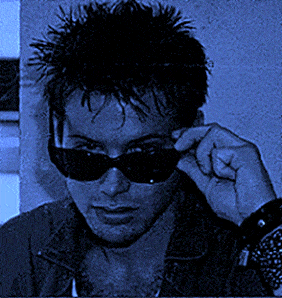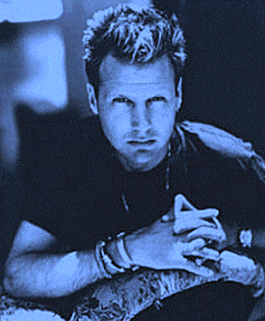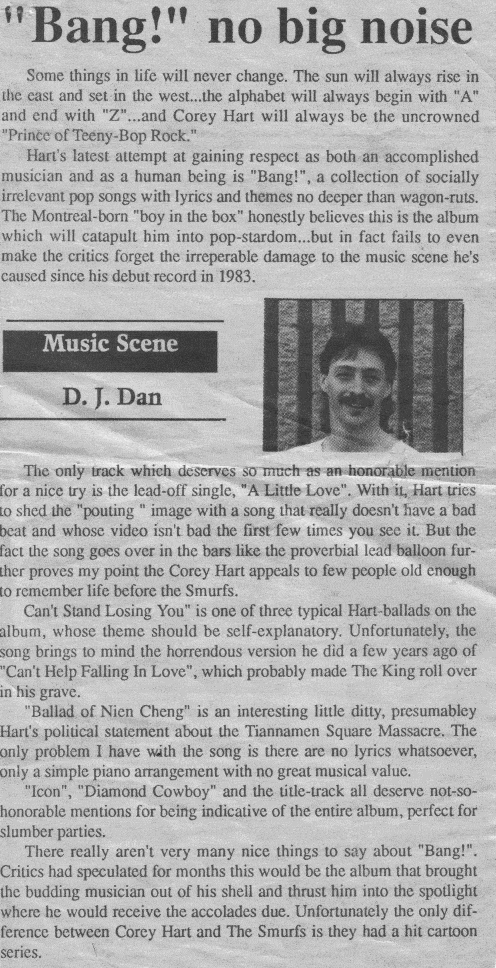 After returning to Montreal at the age of 17, he tried his hand at being a singer/songwriter, and financed some demos on his own, shopping them around both locally and in New York. With no experience on stage under his belt, he eventually caught the attention of Aquarius Records in 1983 at the age of 18. He was signed to a deal and sent to Revolution and Eel Pie Studios in England to work with Phil Chapman and Jon Astley. Label execs had such confidence in the budding star that they even granted him complete control over the material, letting him write his own music and lyrics over a three-month period. The supporting cast of session musicians included Gary Tibbs on bass, Astley, Mike Hehir, Andy Mac, and Andy Bennett on guitars, Richie Close on keyboards, drummer Paul Burgess, and even Eric Clapton. The sessions had all but wrapped up and we’re almost ready to go to the final mix stage when the label insisted two songs not originally intended for an album be included, “At The Dance” and what would make him the poster child of Canadian ’80s, “Sunglasses At Night.” With EMI taking care of distribution Stateside, FIRST OFFENSE was released in the spring of ’84, and immediately cracked the top 10 at home and the top 20 in the US, thanks in no small part to the video age. Hart’s meteoric rise to fame was due in part to his brooding intensity and boyish good looks to the teenage girls. He was described as a “new age Paul Anka,” but his angry, pouting young man image drew comparisons of him to James Dean or a young Marlon Brando. “Sunglasses At Night” was an overnight hit on the burgeoning MuchMusic and on MTV, and was followed by “It Ain’t Enough.” Hart had still never even stepped on to a stage yet, but he landed the opening slot on Culture Club’s show at the Montreal Forum. The touring group he assembled was the bulk of his session players, but many industry insiders thought for sure Hart didn’t stand a chance of winning over the critics. But this was his home turf, and with “Sunglasses At Night” shooting up both the radio and video charts, he let it be known he was for real. This opened the doors for tours with April Wine, Thomas Dolby, Rick Springfield, and Hall & Oates for the next year and a half across North America, and into Australia and Japan. His charm with the younger ladies translated well to the new music medium, and with “It Ain’t Enough” and “She Got The Radio” soon following up the charts, the album went double platinum, and was nominated for a Grammy but lost to Cyndi Lauper for best new artist. But the song that made him an overnight sensation won the Juno Award for best video, the first time the category had been included in the ceremony. He hooked up with Chaman and Astley again for the follow-up, BOY IN THE BOX, but he found life on the road wasn’t necessarily conducive to songwriting. With only a handful of songs ready to go, he entered Le Studio in Morin Heights, Quebec in the spring of ’85. Showing incredible confidence in the young artist, label execs gave him even more creative slack, letting him co-produce the record. The result was the first album certified diamond (two million copies) by a Canadian artist since Bryan Adams. “Never Surrender” won a Juno that year for top single, and got him a Grammy nomination for the second straight year. More continuous touring ensued to support the following singles, the title track, “Komrade Kiev,” and “Eurasian Eyes, taking him from coast to coast, down south, and back to Japan. The propaganda machine was steamrolling the planet, and to play on the yuletide dollar, even released a version of “Rudolph The Red-Nosed Reindeer” as the b-side to “Everything In My Heart.” Still selective about the projects he involved himself in, Hart turned down the leading role in the film “Back to the Future,” as well as the offer to perform the hit song “Danger Zone” for the film “Top Gun.” With practically no time off from the road, he returned to Le Studio a year later with Chapman, but not Astley, and began working on the follow-up. As usual, when everyone else thought the recording was done, Hart had one of his last-minute ideas, and lay down the tracks to a cover of “Can’t Help Falling In Love.” He arranged, recorded, and mixed the Elvis cover in a single day, and later said he wasn’t necessarily totally satisfied with, and figured it would be an obscure b-side at best. But after hearing it, Aquarius execs pushed it as the album’s first single for FIELDS OF FIRE. The song quickly went gold, and next up were “I Am By Your Side,” “Take My Heart,” “Too Good To Be Enough,” and “Dancin’ With My Mirror.” Although they all kept the record factories in business, they all faltered on Billboard, and despite the gold album, were causing disenchantment with management. “Hold On” was released as a single after appearing on the “Beverly Hills Cop II” soundtrack, but the hectic touring and promotional appearances were wearing Hart done, and ended up causing the cancellation of half of 1987’s schedule. Rejunevated and revitalized, he returned to the limelight before Christmas in the form of a CBC documentary on still one of Canada’s most played video stars. That featured a portion of a Montreal show earlier that year and later won the Golden Gate Award for best fine arts or musical variety show at the San Francisco International Film Festival. He set back on the road a few months later to promote the new album, 1989’s YOUNG MAN RUNNING. Hart was now totally in control of production, writing, arrangement, and everything else other than coffee runs, three singles were released, but “In Your Soul,” “Spot You In A Coalmine,” and “Still In Love” all failed to recapture what was clearly declining sales. If things weren’t bad enough with Aquarius brass, the suits in the US management team didn’t care for Hart’s way of doing things. Those less than amicable differences caused his removal from their client list while he was in the middle of a tour, causing him to once again cancel the rest of the dates. He came home and became reclusive, working on his comeback. The label insisted on him working with producer Greg Edward (Stevie Nicks, Bob Seger) in LA, but BANG! came out with little more than a pop in the summer of 1990. Going over like the proverbial lead balloon, the only glimmer of what his sales once were only a few short years earlier was the lead-off single, He again retreated to the confines of his Montreal home, around the same time as an endless flood of remixed ‘best of’ packages began filling the shelves for the next two decades. He landed a deal with Sire Records and returned with ATTITUDE AND VIRTUE in 1992. Undeterred from the lacklustre response given to the singles “92 Days of Rain,” “Baby When I Call Your Name,” “Always,” or “I Want,” he set out on the road, revitalized, made over, and determined to show the world he was all grown up. For the most part, album sales matched ticket sales – not particularly fantastic, and he again slunk out of the limelight. Disenchanted, he stayed in the shadows for the next four years, spending his time divorcing his teen sweetheart and beginning a new relationship with Quebec singer Julie Masse, and began lending his songwriting and production talents to other artists, including Masse and other Quebec stars Cherie, Garou, Wilfred Le Bouthillier, Cherie, and Celine Dion, among others. He also appeared on a duet with Japanese sensation Shoko Suzuki’s single “Original Aim,” and contributed “Hymn To Love” on THE EDITH PIAF TRIBUTE album in ’93 His next attempt at a comeback came in the form of 1996’s self-titled and self-produced album for Sony. Heralded by the critics who’d grown up and weren’t expecting the pouting image of the teen star of so long ago, the album still failed to make a dent in the charts, failing to chart on either side of the border, or either side of the ocean, despite the release of the singles “Black Cloud Rain,” or “Tell Me.” The third single, however, “Third Of June” topped Canada’s singles charts, a song he’d written for new wife Masse’s birthday. “So Visible” was the only single from his next project, JADE, released in 1998. Sporadic touring didn’t help dwindling sales and Sony dropped him from their roster, and he again all but dropped off the face of the planet. SOCAN honoured Hart in 2002 with two Classic Song Awards for ‘Sunglasses at Night’ and ‘In Your Soul,’ and a Number One Dance Single Award for ‘Sunglasses at Night.” He continued working with other artists through a deal with Warner Brothers and released the independent WORDS LIKE WILDFIRE in 2007 amid more compilation albums during the period in between, but the record came and went without a notice. |

 “A Little Love.” The title track, then “Rain On Me” followed. But without solid touring and unimpressed without even one top 40 on Billboard, Hart was dropped from the label early the next year.
“A Little Love.” The title track, then “Rain On Me” followed. But without solid touring and unimpressed without even one top 40 on Billboard, Hart was dropped from the label early the next year.